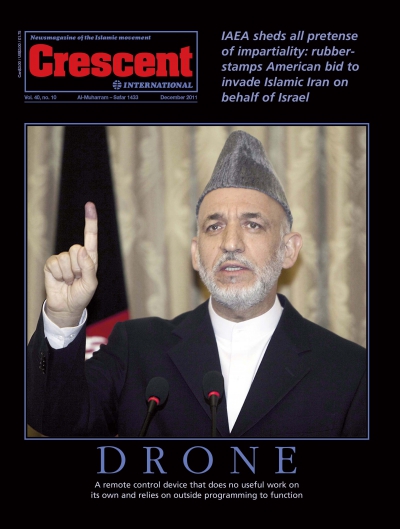Crescent International Vol. 40, No. 10
Newsmagazine of the Islamic movement
Zafar Bangash, Afeef Khan, Muhammad H. al-'Asi
Muharram, 1433 2011-12


As mass popular movements sweep the Muslim East (aka Middle East) predatory Western powers and their local satraps are involved in desperate attempts to hijack them. They are offering the same failed systems in a new garb. Since the overwhelming majority in the region is Muslim, it is natural that they would want a social order connected to Islamic principles that represent and ennoble their unique identity.

In contemporary global politics, two ingredients are considered essential to project power: wealth and military might. The two are inter-related. Obviously, without wealth, military hardware cannot be acquired and without military might, wealth can neither be protected nor additional amounts accumulated. There is also a third factor: the power of iman (faith-commitment).

There are a host of organizations — the United Nations (UN) with its Security Council, the International Monetary Fund (IMF) and the International Atomic Energy Agency (IAEA) — that are touted as world bodies whose function is to maintain peace, security and stability — financial and nuclear — in the world. The UN and IMF were created around the time of World War II.

Every four years the world watches the political soap opera of the US presidential elections with a combination of amusement, bemusement and incredulity as the world’s most powerful nation, and the supposed flag-bearer of democracy, lays open its true nature. Although the polls are not due for over a year, the formal process began months ago, with Barrack Obama having announced the start of his re-election campaign in April.

Is the US endgame in Afghanistan real? If so, it appears to have entered a crucial phase under the cover of a series of international conferences to facilitate US troop withdrawal from the war-torn country. Some observers, however, believe America is playing a double game trying to give the impression of preparing to leave while working behind the scenes to establish permanent military bases in the country.

Weeks before the International Atomic Energy Agency (IAEA) report was released on November 8, Western media outlets had already worked themselves into frenzy, drum-beating about how Iran would be found in “violation” of its nuclear Non-Proliferation Treaty (NPT) obligations by secretly diverting material to make the bomb.

In the face of its collapsing economy and spiraling domestic unrest, the US is blithely proceeding with its blueprint of remaking world cartography. After dispatching Muammar Qaddafi in a hail of gunmetal, US imperialists are confronting the Syrian stumbling block, item No. 2 on its regime change wish-list.

The Saudi-ruled kingdom is heading for turbulent times. It faces challenges on both external and internal fronts. No, there is no imminent threat of a military invasion from abroad. It is the invasion of ideas that is scaring the living daylights out of members of the House of Saud.

Although not given much publicity in the Western media, Saudi Arabia has been brutally suppressing political dissidents. The monarchy does not allow any form of criticism and has instituted harsh measures to silence any critical voices. As a result of this many human rights activists, bloggers, reformists, academics and religious leaders have been detained by Saudi security forces.

“Come, I will make the continent indissoluble… O Democracy” once sang Walt Whitman, the 19th-century US poet laureate. With the unrest in Oakland, Portland, Berkeley, New York City, spanning the indissoluble continent as it were, democracy has once more become an unknown quantity, subject to definition.

On October 29, Muslim researchers, journalists and editors gathered in Tehran to inaugurate the establishment of the Press Union of the Islamic World. The first general assembly session of the press union attracted Muslim media professionals from 38 countries representing different media outlets including Crescent International.

South African civil society formations can be justifiably proud of pulling off one of the most serious challenges confronting Israel: the question of apartheid. By successfully hosting on November 5–7, a venerable “people’s court” within the precincts of a looming symbol of resistance against apartheid — the District 6 Museum — they made a powerful statement whose effects are still creating waves of discontent.

Since January 2011, Syrian streets have been hit by a protest demanding removal of the Ba‘th regime and Bashar al-Asad from power. A growing armed insurgency and other developments, which took place in November, showed that the situation is getting out of control, dragging the country into a bloody civil war.

Iraq War veteran, Ross Caputi, writes about his thoughts on the role of veterans in the Occupy movement. The author is a Marine Corps veteran of the second siege of Fallujah and a member of March Forward! He is the founder of the Justice for Fallujah Project, which hosted various events during the second annual Remember Fallujah Week, November 16-19, 2011.

General Mirza Aslam Beg — who is the former Chief of Army Staff of Pakistan and currently Chairman of the Islamabad-based NGO, Foundation for Research on International Environment, National Development and Security (FRIENDS) — expresses some of his views about the Islamic resistance and Pakistan.

One of the more bizarre cases of terrorism, which reflects more the criminal nature of Indian police, is coming to a close. Seven of the nine Muslim youth accused in the September 8, 2006 Malegaon blast, were granted bail on November 16 by a Special Court in Mumbai. The blast killed 37 people and wounded hundreds of others. That most of the victims were Muslims did not bother the police or the anti-terrorism squad.
